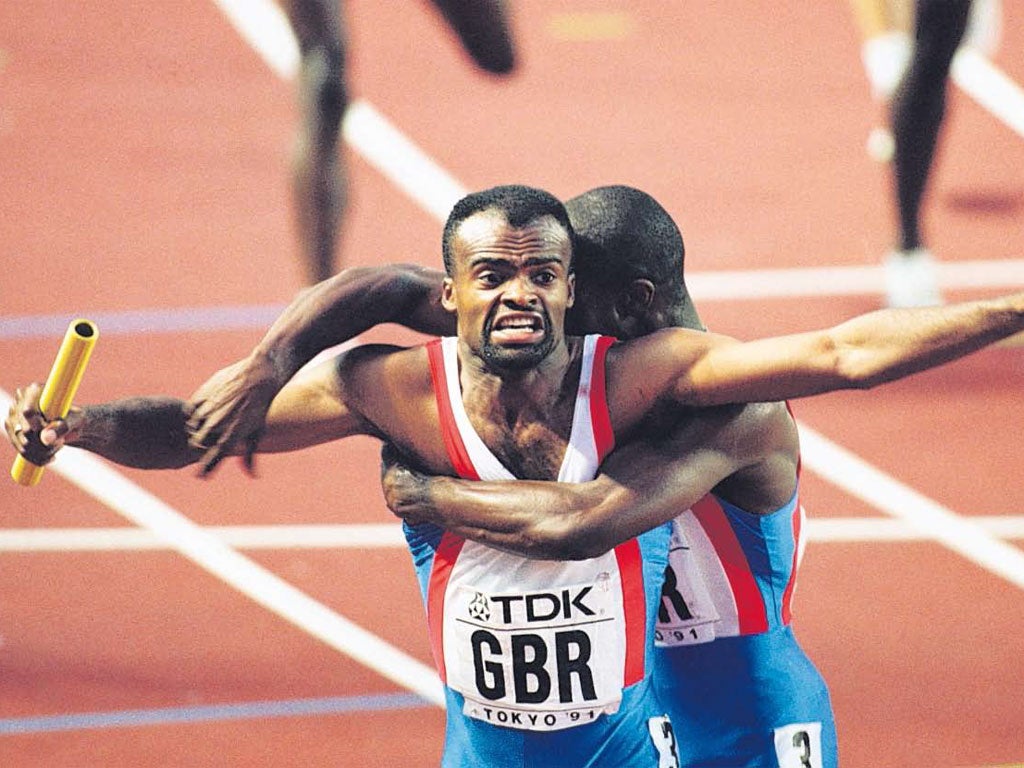Kriss Akabusi takes the fast track to business success
Peter Brown meets a gold medallist who’s signed up for an Executive MBA

Your support helps us to tell the story
From reproductive rights to climate change to Big Tech, The Independent is on the ground when the story is developing. Whether it's investigating the financials of Elon Musk's pro-Trump PAC or producing our latest documentary, 'The A Word', which shines a light on the American women fighting for reproductive rights, we know how important it is to parse out the facts from the messaging.
At such a critical moment in US history, we need reporters on the ground. Your donation allows us to keep sending journalists to speak to both sides of the story.
The Independent is trusted by Americans across the entire political spectrum. And unlike many other quality news outlets, we choose not to lock Americans out of our reporting and analysis with paywalls. We believe quality journalism should be available to everyone, paid for by those who can afford it.
Your support makes all the difference.Anyone who doubts the possibility of coming from behind to beat a rival should take a look at Kriss Akabusi’s gold-winning relay run at the 1991 World Championships in Tokyo. He overtook America’s Antonio Pettigrew, himself a gold medallist, on the final bend setting a British relay record in the process. It still makes riveting viewing on YouTube.
“You’ve got to believe in yourself,” Akabusi says, after a career in which he picked up three Olympic medals and earned himself an MBE before turning to motivational speaking. His hearty laugh has also made him a legend on television quiz shows.
But, as they say in athletics, it’s no good standing still. Aware that the London Olympics could spawn a new brood of corporate speakers, Akabusi has signed up for the redesigned two-year executive MBA at Ashridge Business School in Hertfordshire.
“I’ve got 15 years’ experience as a [corporate] communicator,” he says. “But the more I get into this work the more I realise that there are tensions and frictions that I know very little of, and language I don’t understand.”
He also wants to differentiate himself from the other athletes who will be matriculating after the London Olympics.
“I’m really proud that I was one of the first athletes to forge a career as a speaker,” he says, “but once you become a trailblazer you lead a lot of other people. I still want to be ahead of the game.”
The same kind of forward thinking has inspired Narendra Laljani, who, as dean of graduate studies at Ashridge, has been largely responsible for reshaping the school’s MBA.
Ashridge’s full-time students, unlike those at other schools, tend to be midcareer professionals and therefore in the same age range as the part-timers (who, like Akabusi, usually live within easy reach of the school). The new MBA brings both groups together for much of the curriculum.
“Putting the two together injects some more diversity into the classroom, which everybody enjoys,” Laljani says. “Our full-timers benefit from working alongside people who are in companies and talking about real things. It also makes the executive classroom more international.”
Teaching methods are changing too. Ashridge is developing a virtual MBA learning zone. “The basic knowledge pieces will be served digitally and the classroom will focus much more on value-added learning.”
There will be a new personal mentoring programme and new modules, including one on managerial economics. A module on personal impact will look at how professionals present themselves, communicate complex ideas, listen and engage with teams.
“It will focus on individual selfawareness, emotional intelligence and empathy,” Laljani says. “It has a large component of simulation, with role-play using actors. So it promises to be very entertaining.”
The programme, which starts in September, has four key themes – leading change, creating value, embedding sustainability and managing globally – and culminates in an overseas consultancy project. Exams will be replaced by work-based assignments, with constant evaluation.
“I think it’s the grown-up way,” says Akabusi, who has a degree from an American university. “I’m expecting the MBA to be hard work, but I’m also expecting to have help.”
Join our commenting forum
Join thought-provoking conversations, follow other Independent readers and see their replies
Comments